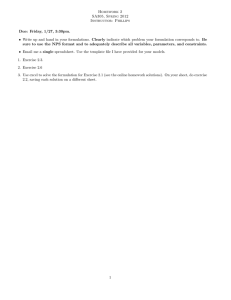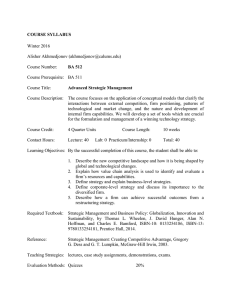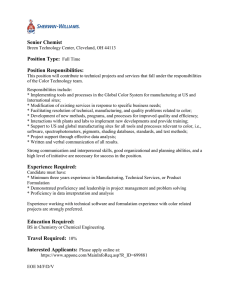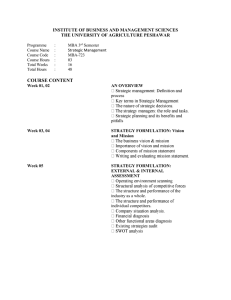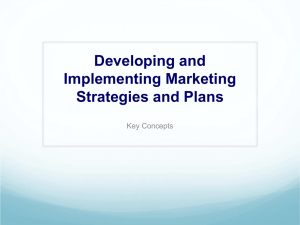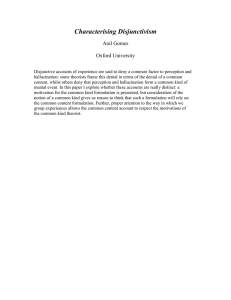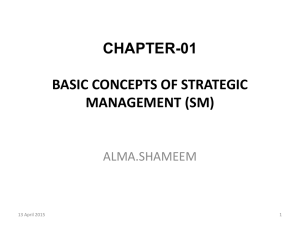Document 13308605
advertisement
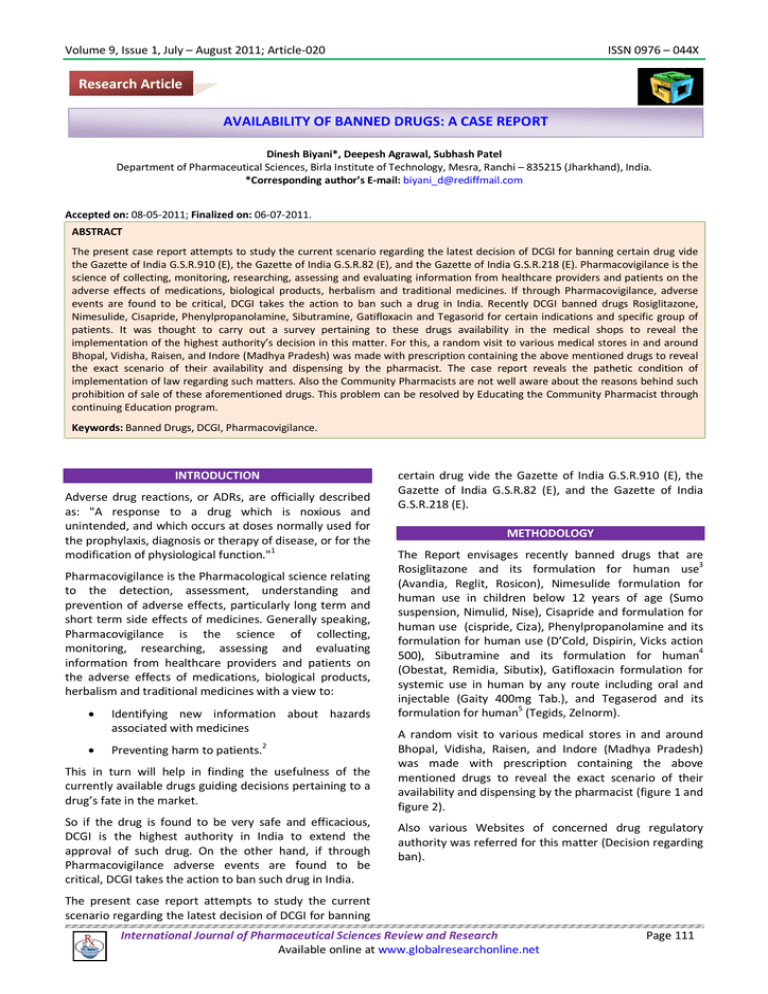
Volume 9, Issue 1, July – August 2011; Article-020 ISSN 0976 – 044X Research Article AVAILABILITY OF BANNED DRUGS: A CASE REPORT Dinesh Biyani*, Deepesh Agrawal, Subhash Patel Department of Pharmaceutical Sciences, Birla Institute of Technology, Mesra, Ranchi – 835215 (Jharkhand), India. *Corresponding author’s E-mail: biyani_d@rediffmail.com Accepted on: 08-05-2011; Finalized on: 06-07-2011. ABSTRACT The present case report attempts to study the current scenario regarding the latest decision of DCGI for banning certain drug vide the Gazette of India G.S.R.910 (E), the Gazette of India G.S.R.82 (E), and the Gazette of India G.S.R.218 (E). Pharmacovigilance is the science of collecting, monitoring, researching, assessing and evaluating information from healthcare providers and patients on the adverse effects of medications, biological products, herbalism and traditional medicines. If through Pharmacovigilance, adverse events are found to be critical, DCGI takes the action to ban such a drug in India. Recently DCGI banned drugs Rosiglitazone, Nimesulide, Cisapride, Phenylpropanolamine, Sibutramine, Gatifloxacin and Tegasorid for certain indications and specific group of patients. It was thought to carry out a survey pertaining to these drugs availability in the medical shops to reveal the implementation of the highest authority’s decision in this matter. For this, a random visit to various medical stores in and around Bhopal, Vidisha, Raisen, and Indore (Madhya Pradesh) was made with prescription containing the above mentioned drugs to reveal the exact scenario of their availability and dispensing by the pharmacist. The case report reveals the pathetic condition of implementation of law regarding such matters. Also the Community Pharmacists are not well aware about the reasons behind such prohibition of sale of these aforementioned drugs. This problem can be resolved by Educating the Community Pharmacist through continuing Education program. Keywords: Banned Drugs, DCGI, Pharmacovigilance. INTRODUCTION Adverse drug reactions, or ADRs, are officially described as: "A response to a drug which is noxious and unintended, and which occurs at doses normally used for the prophylaxis, diagnosis or therapy of disease, or for the modification of physiological function."1 Pharmacovigilance is the Pharmacological science relating to the detection, assessment, understanding and prevention of adverse effects, particularly long term and short term side effects of medicines. Generally speaking, Pharmacovigilance is the science of collecting, monitoring, researching, assessing and evaluating information from healthcare providers and patients on the adverse effects of medications, biological products, herbalism and traditional medicines with a view to: Identifying new information about hazards associated with medicines Preventing harm to patients. 2 This in turn will help in finding the usefulness of the currently available drugs guiding decisions pertaining to a drug’s fate in the market. So if the drug is found to be very safe and efficacious, DCGI is the highest authority in India to extend the approval of such drug. On the other hand, if through Pharmacovigilance adverse events are found to be critical, DCGI takes the action to ban such drug in India. certain drug vide the Gazette of India G.S.R.910 (E), the Gazette of India G.S.R.82 (E), and the Gazette of India G.S.R.218 (E). METHODOLOGY The Report envisages recently banned drugs that are Rosiglitazone and its formulation for human use3 (Avandia, Reglit, Rosicon), Nimesulide formulation for human use in children below 12 years of age (Sumo suspension, Nimulid, Nise), Cisapride and formulation for human use (cispride, Ciza), Phenylpropanolamine and its formulation for human use (D’Cold, Dispirin, Vicks action 500), Sibutramine and its formulation for human4 (Obestat, Remidia, Sibutix), Gatifloxacin formulation for systemic use in human by any route including oral and injectable (Gaity 400mg Tab.), and Tegaserod and its formulation for human5 (Tegids, Zelnorm). A random visit to various medical stores in and around Bhopal, Vidisha, Raisen, and Indore (Madhya Pradesh) was made with prescription containing the above mentioned drugs to reveal the exact scenario of their availability and dispensing by the pharmacist (figure 1 and figure 2). Also various Websites of concerned drug regulatory authority was referred for this matter (Decision regarding ban). The present case report attempts to study the current scenario regarding the latest decision of DCGI for banning International Journal of Pharmaceutical Sciences Review and Research Available online at www.globalresearchonline.net Page 111 Volume 9, Issue 1, July – August 2011; Article-020 ISSN 0976 – 044X RESULTS AND DISCUSSION Rosiglitazone and its formulation are banned in market for human use due to number of serious side effects including cardiovascular events and adverse effects on 6 lipid profile . Rosiglitazone was available in 21 medical stores out of 40 medical stores. Gatifloxacin formulation for systemic use in human by any route including oral and injectable is banned due to liver damage, purpurea and probable Hallucinations11 and it was available in 35 medical stores out of 40 medical stores. Tegaserod and its formulation for human are banned due to increased risks of heart attack or stroke11 and it was available in 5 medical stores out of 40 medical stores. Drugs like Vicks action-500, D’cold Total, and Nise were available without prescription in market. CONCLUSION The case report reveals the pathetic condition of implementation of law regarding such matters. Also the Community Pharmacists are not well aware about the reasons behind such prohibition of sale of these aforementioned drugs. This problem can be resolved by Educating the Community Pharmacist through continuing Education program. Figure 1 Also this seems to be lacuna on the authorities looking after such matters. One important point to consider from this report is availability of Schedule G and/or H without Prescription which strictly are required to be taken under Supervision of Registered Medical Practitioner and to be sold by retail only on Prescription of a Registered Medical Practitioner respectively. REFERENCES 1. “The importance of Pharmacovigilance safety monitoring of medicinal products”, World Health Organization 2002, pp-44. 2. “The importance of Pharmacovigilance safety monitoring of medicinal products”, World Health Organization 2002, pp-42. 3. http://cdsco.nic.in/html/G.S.R%20910E.pdf 4. http://cdsco.nic.in/GSR_82_E.pdf 5. http://cdsco.nic.in/GSR_218%28E%29.pdf 6. http://www.medindia.net/news/Import-andManufacture-of-Rosiglitazone-Banned-75107-1.htm 7. http://indiatoday.intoday.in/site/story/government-bansnimesulide/1/129859.html 8. http://www.indianexpress.com/Storyold/163449/ 9. http://www.hinduonnet.com/2003/01/11/stories/200301 1105120400.htm Figure 2 Nimesulide formulation for human use in children below 12 years of age banned because of its adverse effects on the liver 7 and it was available 40 medical stores out of 40 medical stores. Cisapride and formulation for human use is banned due to serious heartburn 8 and it was available in 12 medical stores out of 40 medical stores. Phenylpropanolamine and its formulation for human use has been banned due to haemorrhagic stroke9 and it was available in 40 medical stores out of 40 medical stores. Sibutramine and its formulation for human use is banned due to heart attacks, cardiac arrests and even stroke10 and it was available in 5 medical stores out of 40 medical stores. 10. http://www.indianexpress.com/news/slimming-drugsibutramine-banned-in-india/710526/ 11. http://www.technospot.in/risky-drugs-gatifloxacin-andtegaserod-banned-in-india/ *************** International Journal of Pharmaceutical Sciences Review and Research Available online at www.globalresearchonline.net Page 112
